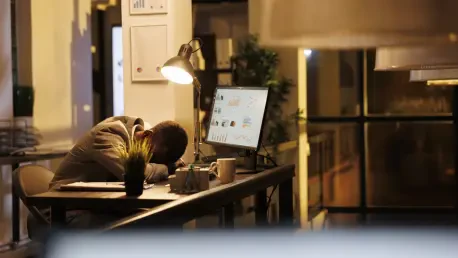With global interest in absenteeism surging, particularly tied to weather patterns like heatwaves, there’s been a notable increase in the use of sick days. This unexpected trend hints at the potential for sick days evolving beyond their traditional role, providing insight into modern workplace dynamics. This shift raises pertinent questions about employee well-being and how companies might create more adaptable environments.
Rethinking Sick Days for Burnout Relief
Burnout impacts a growing number of individuals, particularly in fast-paced job settings where pressure is relentless. Workers face hefty workloads compounded by the financial pressures contributing to the ongoing cost-of-living crisis. Mental health challenges are prevalent, and employees are often overwhelmed as they attempt to balance personal demands with professional obligations. Sick days have emerged as a convenient escape, but this points to a deeper issue of unsustainable work environments that require attention.
Leveraging Sick Days as a Temporary Solution
Reports increasingly indicate that workers—especially young, hybrid professionals—are using sick days to recoup mentally rather than for physical ailments. Not all absenteeism signals a lack of engagement; it often serves as an adaptive response to rigid work cultures. Younger employees, who often navigate fluid working arrangements, present a unique demographic wrestling with burnout. Studies reveal an uptick in absences related to mental health, signaling a cultural shift towards prioritizing wellness.
Insights From Experts on Work Culture Shifts
Katie Howarth from YuLife emphasizes the significant role of control in the evolving use of sick leave, stressing how this trend relates to broader occupational patterns. Various studies corroborate her insights, pointing out the alarming rise in burnout rates and changing perspectives on taking time off. Individual stories highlight how sick days function as crucial mental health breaks, exemplified through firsthand accounts of employees seeking refuge from demanding expectations.
Proactive Measures for Workplace Well-being
Employers across sectors are exploring the potential benefits of flexible work schedules and environments. Concepts like ‘sun leave’ during beautiful weather could transform company cultures by encouraging restorative breaks. Further, digital tools such as gamified well-being applications offer innovative avenues for monitoring employee health proactively. These initiatives not only enhance productivity but also contribute to building supportive and dynamic work settings.
The dialogue around sick days marks a shift toward redefining workplace norms and understanding employee needs. As organizations examine flexibility and employee well-being, strategies emerge to balance performance with recovery. This ongoing conversation offers hope for creating work cultures that prioritize rest and revitalization.









